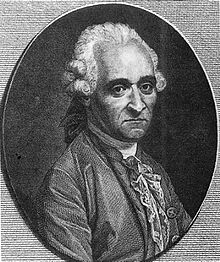- Antoine Court de Gébelin
-
Antoine Court who named himself Antoine Court de Gébelin (ca.1719 – May 10, 1784) was a former Protestant pastor, born at Nîmes,[1] who initiated the interpretation of the Tarot as an arcane repository of timeless esoteric wisdom in 1781.
Contents
Early life
His father was a famous religious leader of the Huguenots. Court de Gebelin had been ordained a pastor in 1754 before departing Switzerland and remained openly Protestant, a rational advocate for freedom of conscience in Enlightenment France. In Paris, he was initiated into Freemasonry at the lodge Les Amis Réunis, in 1771, and moved on to the lodge Les Neuf Sœurs where he welcomed Benjamin Franklin as a lodge-brother.
Career
He was a supporter of American Independence who contributed to the massive Affaires de L'Angleterre et de l'Amérique, of the new theories of economics, and of the "animal magnetism" of Mesmer (with whom he died in an electrical experiment, apparently of an electrically induced heart attack).
His great project had for its goal to set out to reconstruct the high primeval civilization. Reinterpreting Classical and Renaissance evocation of the Golden Age in mankind's early history, Court de Gébelin asserted that the primitive worldwide civilization had been advanced and enlightened. He is the intellectual grandfather of much of modern occultism. His centers of focus are the familiar ones of universal origins of languages in deep time and the hermeneutics of symbolism. While his views on hermeneutics and religious matters were largely conservative, his original ideas and research on the origin of language earn him a place among pioneers of linguistics. Court de Gébelin presented dictionaries of etymology, what he called a universal grammar, and discourses on the origins of language. his volumes were so popular he republished them separately, as Histoire naturelle de la parole, ou Précis de l'Origine du Langage & de la Grammaire Universelle ("Natural history of the Word, or a sketch of the origins of language and of universal grammar"), in Paris, 1776.
With regard to mythology and symbology, he discussed the origins of allegory in antiquity and recreated a history of the calendar from civil, religious, and mythological perspectives.
The tarot
De Gébelin in an essay included in his Le Monde primitif, analysé et comparé avec le monde moderne ("The Primitive World, Analyzed and Compared to the Modern World"), volume viii, 1781. The chapter on Tarot with which his name is indelibly associated is a single section in his vast compendium that he published in series from 1773, to a distinguished list of subscribers, headed by Louis XVI.
It was his immediate perception, the first time he saw the Tarot deck, that it held the secrets of the Egyptians. Writing without the benefit of Champollion's deciphering of the Egyptian language, Court de Gébellin's developed a reconstruction of Tarot history, without producing any historical evidence, which was that Egyptian priests had distilled the ancient Book of Thoth into these images. These they brought to Rome, where they were secretly known to the popes, who brought them to Avignon in the 14th century, whence they were introduced into France. An essay by The Comte de Mellet included in Court de Gebelin's Monde primitif is responsible for the mystical connection of the Tarot's 21 trumps and the fool with the 22 letters of the Hebrew alphabet. An essay appended to this gave suggestions for cartomancy; within two years the fortune-teller known as "Etteilla" published a technique for reading the tarot, and the practice of tarot reading was born.
See also
References
- ^ Encyclopædia Britannica
- Ronald Decker, Thierry Depaulis, Michael Dummett, A Wicked Pack of Cards: The Origins of the Occult Tarot 1996
External links
- Egyptomania of Antoine Court de Gébelin
- James W. Revak, "Biography of Antoine Court de Gébelin"
- Short Biography
- Encyclopædia Britannica, 1911: Antoine Court de Gebelin
- Du Jeu des Tarots. Monde primitif, analysé et comparé avec le monde moderne vol. 8, tom. 1, Paris 1781 (original French)
- Du Jeu des Tarots. Monde primitif, analysé et comparé avec le monde moderne vol. 8, tom. 1, Paris 1781 (English translation)
- Scholar cites Antoine Court de Gébelin as an important figure of the "Dark Enlightenment"
Tarot Tarot, tarock and tarocchi games Major Arcana (Trump cards) I (The Magician / The Juggler) · II (The High Priestess / The Popess) · III (The Empress) · IV (The Emperor) · V (The Hierophant / The Pope) · VI (The Lovers) · VII (The Chariot) · VIII (XI) (Justice) · IX (The Hermit) · X (Wheel of Fortune) · XI (VIII) (Strength / Fortitude) · XII (The Hanged Man / The Traitor) · XIII (Death) · XIV (Temperance) · XV (The Devil) · XVI (The Tower / Fire) · XVII (The Star) · XVIII (The Moon) · XIX (The Sun) · XX (Judgement / The Angel) · XXI (The World) · Unnumbered, XXII or Zero (The Fool) Minor Arcana (Suit cards) Notable decks French suits Italian suits Divinatory, esoteric and occult tarot Antoine Court de Gébelin · Etteilla · Eliphas Levi · Arthur Edward Waite · Aleister Crowley · Paul Foster CaseRelated articles · Cartomancy · Hermetic Qabalah · Mantegna Tarocchi ·
Oracle cards · Playing card · Trick-taking game · Trionfo · Trionfi (cards) · Trump (card games) ·Categories:- Occultists
- Tarot
- Tarot reading
- Occult tarot
- Pseudohistorians
- 1725 births
- 1784 deaths
- French occult writers
- People from Nîmes
- Les Neuf Sœurs
Wikimedia Foundation. 2010.

